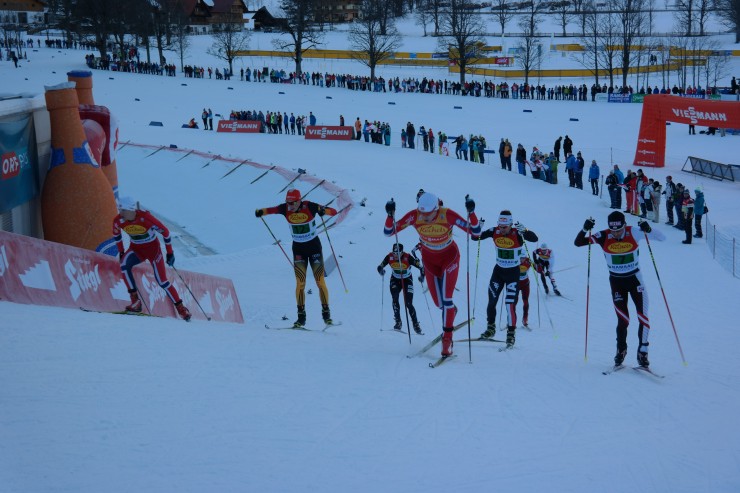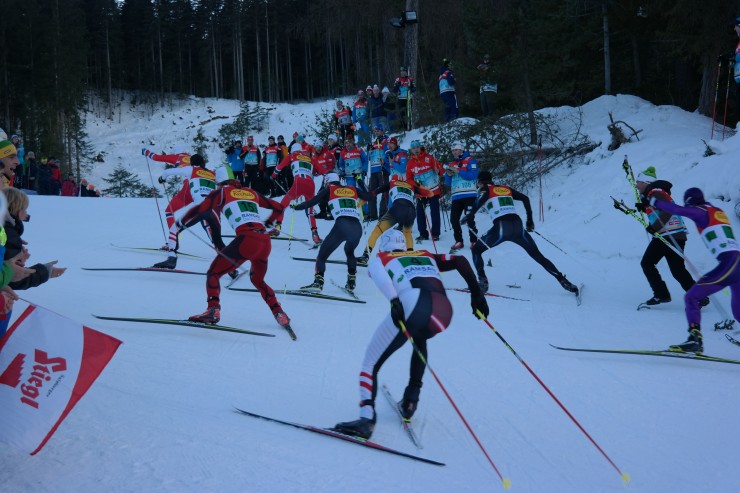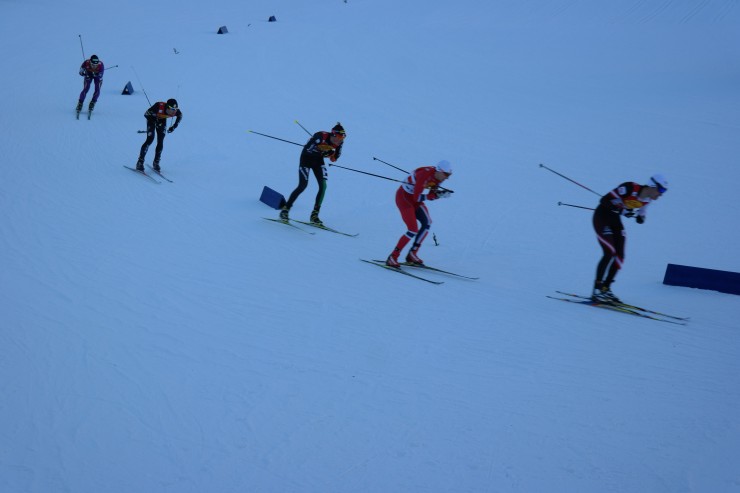
Americans Bryan Fletcher and Todd Lodwick narrowly missed the podium in the 2 x 7.5-kilometer sprint in Ramsau am Dachstein, Austria, finishing fourth for U.S. Nordic Combined’s best result in a team sprint.
A little off in the jumping portion of Saturday’s competition, Fletcher and Lodwick ended up starting 14th of 20 teams, 44 seconds behind the Estonian leaders, Kristian Ilves and Karl-August Tiirmaa.
While the Estonians clocked the second-slowest race time, getting passed by all but two teams to finish 18th, Fletcher and Lodwick rose to the challenge and notched the fastest-combined time to finish 10 seconds behind the winners, Norway’s Mikko Kokslein and Jørgen Graabak, who rose from 11th to first in 33:59.3. Norway’s Haavard Klemetsen and Magnus Krog took second (+8.2) after jumping to sixth, and Italy’s Samuel Costa and Alessandro Pittin captured third just 1.2 seconds ahead of the Americans.
According to U.S. Head Coach Dave Jarrett, skiing fast was their plan all along.
“It was a really tight jumping competition, so we knew after that result, they were in a position to fight for a podium,” he said in a phone interview. “That’s what we’ve been saying all along, that we need to just put ourselves in that position and then we should hopefully be able to take advantage of that.”
Most teams wouldn’t consider starting 14th ideal, but it was time back that mattered to Fletcher and Lodwick. And fourth place was nothing to scoff about — it was the best U.S. finish in the relatively new event.
“It’s definitely a solid day,” said Fletcher, who’s notched a World Cup top 10 five other times in the last three years. “We turned some tough jumping into a great cross-country race, so it was a positive performance all around.”
“We’re really, really proud to put Norway in its place and to know that we are the fastest team out there, whether it’s by a second or ten seconds, it doesn’t matter. We are the fastest team and it shows on the results.” — Todd Lodwick
According to Jarrett, there were 12 teams bunched together at one point, making the exchanges “pretty interesting.”
“Some people had more luck than others in the exchange zone,” he said. “Todd and Bryan were smart and they did a good job tagging off and kind of pacing themselves and placing themselves among the lead group. When the last two laps came around, the Norwegians were in a good spot and they got a gap on the field.”
While jumping hasn’t been a strong point for the Americans in the first World Cups of the season, Fletcher said Saturday was a confidence booster.

“I haven’t had quite my best performances on the jump hill, but I’ve kind of nailed my problems and working to fix them and I thing that’s a positive take away from it,” he said. “Today I had a really good jump in the trial round and then the competition jump was close. It definitely wasn’t what I’m capable of, but it was in the hunt and that’s all we needed.”
Lodwick added a solid jump to the mix, which Fletcher said brought them closer to the front of the pack. “Overall it wasn’t our best day on the jump hill, but we weren’t out either,” Fletcher said.
“I didn’t jump horrible,” Lodwick said. “It’s just missing just a little bit and that’s going to come. The more we compete, the better off we get and we’re going to be in really, really top shape.”
For the 37-year-old Lodwick, it wasn’t his best overall performance in nearly two decades on the World Cup, but he said it was up there with those he’s proud of. Last Sunday in Lillehammer, Norway, he placed 11th for his best result in nearly three years. In the same race, Fletcher placed 10th.
“I know that we’re on the right track,” he said. “We’re on the verge of just making the season. It’s been a slow [start], but results like that give us a lot of confidence so we’re excited.”
Last year, the U.S. broke through in a World Cup 4 x 5 k team event in Schonach, Germany, with their first third-place finish. Both Fletcher and Lodwick were on that team with Billy Demong and Taylor Fletcher, and those four went on to notch a historic bronze at 2013 World Championships in Val di Fiemme, Italy. Lodwick also has also helped the team to a few fourth-place results in previous relays.

A World Cup competitor since 1995, Lodwick laughed and said, “I am the oldest guy on the circuit.”
But his past experiences helped him post one of the fastest individual times in Saturday’s race.
“I don’t feel [old] in my body or my heart and I went out there and knew that staying in the front pack and positioning and taking corners the right way and pushing people out and not letting people in,” he said. “That’s just what it takes to be aggressive and to be in that pack. Within this packed kind-of race, it definitely takes a little bit of skill and knowledge. I guess I relied on that.”
Although the team sprint will not be a medal event at the Olympics in February, Lodwick said their cross-country times should come as a warning to the competition they’ll meet at the 2014 Games.
“We train all summer and to have a result like [this] is humbling,” he said. “We’re really, really proud to put Norway in its place and to know that we are the fastest team out there, whether it’s by a second or ten seconds, it doesn’t matter. We are the fastest team and it shows on the results and we can chock that up for a win.”
The second U.S. team, with Brett Denney and Taylor Fletcher, placed 15th, 1:36 back from the winners. Taylor clocked the fastest individual time of 16:50.7. Teammate Billy Demong is resting this weekend in anticipation of next week’s Continental Cup in Park City, Utah.
Had Demong been on skis Saturday, Jarrett said it’s likely the U.S. could have had an even-stronger showing.
“Bill would have been a really useful addition into one of the teams today and could have been more like the Norwegians or Japanese or Germans that have two teams fighting in that top 12 for sure,” he said.
He added that there’s still plenty of jumping and racing left in the season before the team heads for Russia.
“Our sights are set and we’re measured against our results in the [Vancouver] Olympics,” he said of their unprecedented medal haul at the 2010 Games. “USSA has made it no secret that [the 2014] Olympics are what they’re measuring everything against, and our plan is to do well in [Sochi].
“It’s a tall order because the Olympics only come around once every four years and it’s only one day for that competition and there’s a lot of variables that can take place,” he explained. “But we’re going to continue to work in each competition and just live up to our potential.”
He said his team is nowhere near its February peak. “It’s always good mentally to have good results every time you do a competition,” he said. “I think these guys are focused and ready to continue competing. We have another individual competition [Sunday], and then two more next weekends and then Olympic tryouts in Park City, and then three more weekends in January. There’s plenty more.”
Bryan said he was looking forward to what’s to come, especially given the season’s slow start.
“We know that this time of year can either go one of two ways,” he said. “You can either come into the World Cup season and start off doing great and sometimes you come in with a little bit of a rough start like we had this year.”
Each week, it’s a matter of building on the previous week, he explained. “These last two weekends especially, we’ve really taken some positive steps forward to show we’re not out of the game. We are here to contend. We just narrowly missed the podium but given the circumstances, we’re pretty happy about the fourth place and I think these narrow misses just make us hungry for more.”
— Alex Matthews contributed reporting
Emily Schwing
Emily Schwing is a public radio reporter in Interior, AK. She normally writes about athletes of the four-legged kind. When she's not chasing dog teams, skiers and local news, she's breaking trail on her rock skis with a dog name Ghost. Follow her on Twitter @emilyschwing



